-
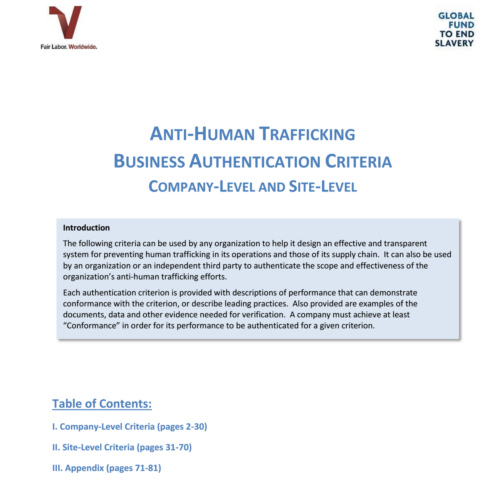 Verite have published guidance on establishing an effective and transparent system to protect against modern slavery in supply chains. It details both in-company and site-level guidance. The criteria provided are intended to be used by any organisation to help design a system for preventing human trafficking within business operations and the supply chain. Each authentication criterion is accompanied by examples of leading practice and verification evidence.
Verite have published guidance on establishing an effective and transparent system to protect against modern slavery in supply chains. It details both in-company and site-level guidance. The criteria provided are intended to be used by any organisation to help design a system for preventing human trafficking within business operations and the supply chain. Each authentication criterion is accompanied by examples of leading practice and verification evidence. -
 This report, published by the Chartered Institute of Building, calls for industry collaboration to eradicate modern slavery in supply chains, procurement and migrant labour. It offers many recommendations to companies within the industry which are also highly relevant to the hotel industry including guidance on supply chain mapping, corporate policy, training, navigating potential risks with third party agencies, and collaborating with NGOs and government.
This report, published by the Chartered Institute of Building, calls for industry collaboration to eradicate modern slavery in supply chains, procurement and migrant labour. It offers many recommendations to companies within the industry which are also highly relevant to the hotel industry including guidance on supply chain mapping, corporate policy, training, navigating potential risks with third party agencies, and collaborating with NGOs and government.Credit: Chartered Institute of Building (CIOB)
-
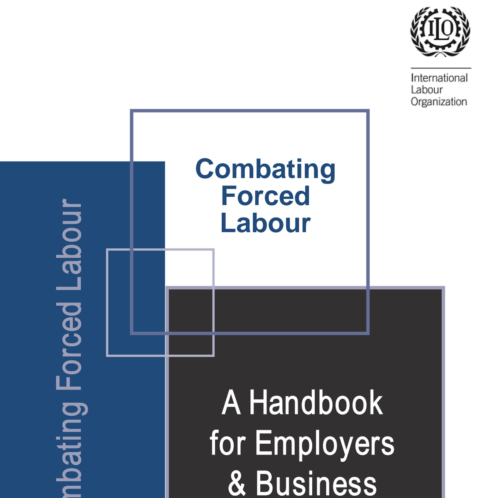 The ILO is the UN organisation responsible for setting and monitoring international labour standards. This handbook is intended as a resource for employers to coordinate a response to the risk of forced labour and human trafficking in supply chains. It is also intended to help strengthen capacity to address issues in operations and global supply chains. It provides employees and employers at different levels of business with guidance and tools to address the issue, and to identify and prevent trafficking.
The ILO is the UN organisation responsible for setting and monitoring international labour standards. This handbook is intended as a resource for employers to coordinate a response to the risk of forced labour and human trafficking in supply chains. It is also intended to help strengthen capacity to address issues in operations and global supply chains. It provides employees and employers at different levels of business with guidance and tools to address the issue, and to identify and prevent trafficking.Credit: International Labour Organisation (ILO)
-
 Stronger Together is a multi-stakeholder initiative which aims to reduce modern slavery. It provides guidance, training and resources to organisations, employers, labour providers, workers and their representatives. This free collection of resources includes pragmatic guidance and toolkits, and resources for the workplace including multilingual posters, leaflets and template policies. This template is to be modified as required and for inclusion with a wider Tackling Modern Slavery in Business and Supply Chain or Business Human Rights Policy.
Stronger Together is a multi-stakeholder initiative which aims to reduce modern slavery. It provides guidance, training and resources to organisations, employers, labour providers, workers and their representatives. This free collection of resources includes pragmatic guidance and toolkits, and resources for the workplace including multilingual posters, leaflets and template policies. This template is to be modified as required and for inclusion with a wider Tackling Modern Slavery in Business and Supply Chain or Business Human Rights Policy.Credit: Stronger Together
-
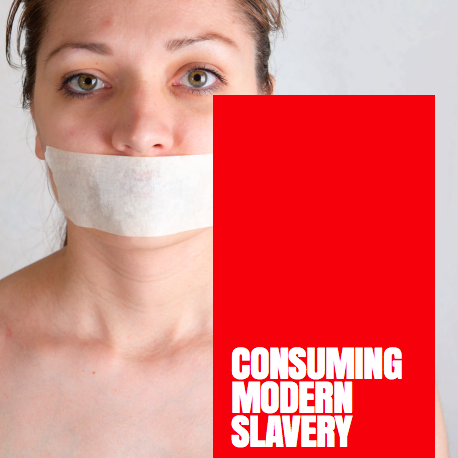 This report investigates how consumers understand modern slavery and their role in perpetuating and/or eradicating modern slavery. It is organised into three sections. The first section focuses on consumer perceptions of modern slavery, the second on consumer accounts and justifications for (widespread) inaction in relation to modern slavery, and the third on questions of consumer trust and responsibility within a multi-stakeholder environment. For each section findings are combined with related prior academic research and suggestions for change are made.
This report investigates how consumers understand modern slavery and their role in perpetuating and/or eradicating modern slavery. It is organised into three sections. The first section focuses on consumer perceptions of modern slavery, the second on consumer accounts and justifications for (widespread) inaction in relation to modern slavery, and the third on questions of consumer trust and responsibility within a multi-stakeholder environment. For each section findings are combined with related prior academic research and suggestions for change are made.Credit: University of Glasgow, University of Melbourne, Royal Holloway University of London
-
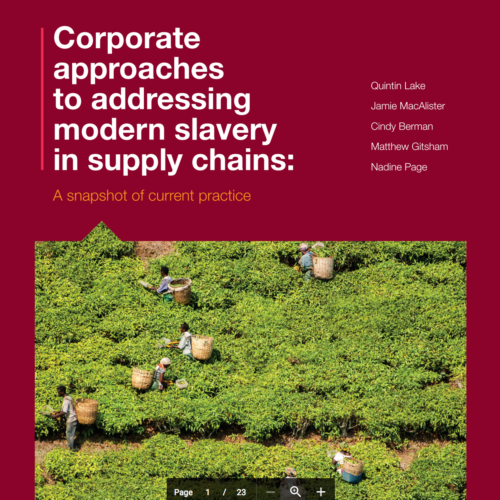 The ETI is an alliance of companies, trade unions and NGOs that promotes workers' rights around the world. This report is the outcome of interviews and surveys with 21 retailers and tier 1 companies across a range of sectors. It is intended to reflect current practice of companies regarding modern slavery and condenses findings into 10 key messages. It is not meant as formal guidance for the industry, but more to provide insight from both ETI and non-ETI members.
The ETI is an alliance of companies, trade unions and NGOs that promotes workers' rights around the world. This report is the outcome of interviews and surveys with 21 retailers and tier 1 companies across a range of sectors. It is intended to reflect current practice of companies regarding modern slavery and condenses findings into 10 key messages. It is not meant as formal guidance for the industry, but more to provide insight from both ETI and non-ETI members.Credit: Ethical Trading Initiative (ETI)
-
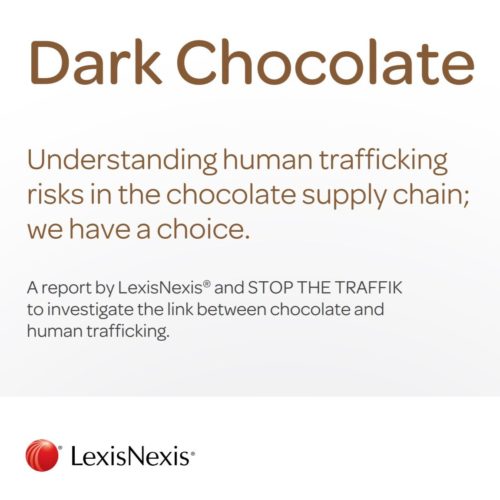 LexisNexis and STOP THE TRAFFIK produced this report after an investigation into the link between chocolate and human trafficking. The report is aimed at consumers seeking to better understand the products they consume, those working with suppliers and NGOs seeking to understand how media cover societal issues.
LexisNexis and STOP THE TRAFFIK produced this report after an investigation into the link between chocolate and human trafficking. The report is aimed at consumers seeking to better understand the products they consume, those working with suppliers and NGOs seeking to understand how media cover societal issues.Credit: Lexis Nexis and Stop the Traffik
-
 Stronger Together is a multi-stakeholder initiative which aims to reduce modern slavery. It provides guidance, training and resources to organisations, employers, labour providers, workers and their representatives. This free collection of resources includes pragmatic guidance and toolkits, and resources for the workplace including multilingual posters, leaflets and template policies. This template is to be modified as required and for inclusion with a wider Tackling Modern Slavery in Business and Supply Chain or Business Human Rights Policy.
Stronger Together is a multi-stakeholder initiative which aims to reduce modern slavery. It provides guidance, training and resources to organisations, employers, labour providers, workers and their representatives. This free collection of resources includes pragmatic guidance and toolkits, and resources for the workplace including multilingual posters, leaflets and template policies. This template is to be modified as required and for inclusion with a wider Tackling Modern Slavery in Business and Supply Chain or Business Human Rights Policy.Credit: Stronger Together
-
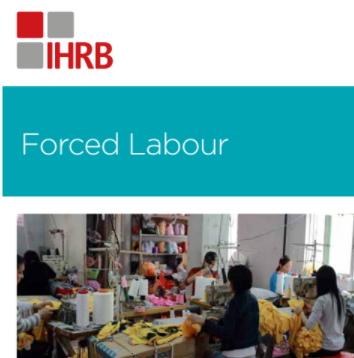 This is a briefing produced by the think tank IHRB on forced labour, its indicators and which industries are particularly affected. It covers how company practice can leave workers vulnerable to modern slavery and lists key standards that work to protect workers against the type of exploitation.
This is a briefing produced by the think tank IHRB on forced labour, its indicators and which industries are particularly affected. It covers how company practice can leave workers vulnerable to modern slavery and lists key standards that work to protect workers against the type of exploitation.Credit: Institute for Human Rights and Business (IHRB)
-
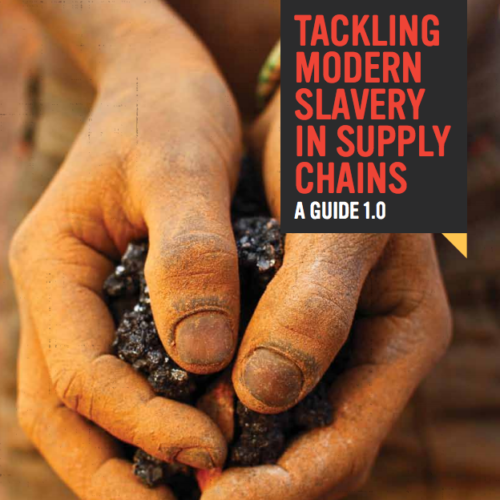 The Walk Free Foundation was established by Andrew Forrest, the Chairman of Fortescue Metals Group, after he found labour exploitation within his own supply chains and took a number of steps to prevent modern slavery affecting his business. This comprehensive guide considers corporate policy on modern slavery and provides both guidance and tools to implement it. It includes advice on corporate policy and provides template examples of a number of tools.
The Walk Free Foundation was established by Andrew Forrest, the Chairman of Fortescue Metals Group, after he found labour exploitation within his own supply chains and took a number of steps to prevent modern slavery affecting his business. This comprehensive guide considers corporate policy on modern slavery and provides both guidance and tools to implement it. It includes advice on corporate policy and provides template examples of a number of tools.Credit: Walk Free Foundation & Verite
-
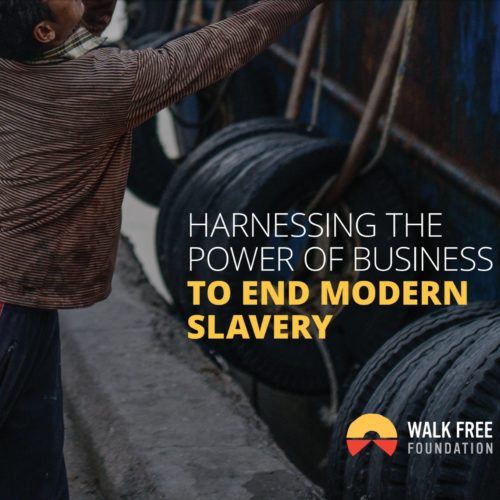 The Walk Free Foundation was established by Andrew Forrest, the Chairman of Fortescue Metals Group, after he found labour exploitation within his own supply chains and took a number of steps to prevent modern slavery affecting his business. This report provides an overview of modern slavery in a global context with statistics, case studies, and review of legislation and policy.
The Walk Free Foundation was established by Andrew Forrest, the Chairman of Fortescue Metals Group, after he found labour exploitation within his own supply chains and took a number of steps to prevent modern slavery affecting his business. This report provides an overview of modern slavery in a global context with statistics, case studies, and review of legislation and policy.Credit: Walk Free Foundation
-
 Hedging Risk by Combating Human Trafficking: Insights from the Private Sector is designed to help companies share best practices so they can mitigate their risks and help eliminate this heinous practice. In this first of a series, we highlight insights and technology-driven interventions in the hospitality, finance, and transportation industries.
Hedging Risk by Combating Human Trafficking: Insights from the Private Sector is designed to help companies share best practices so they can mitigate their risks and help eliminate this heinous practice. In this first of a series, we highlight insights and technology-driven interventions in the hospitality, finance, and transportation industries.Credit: World Economic Forum
-
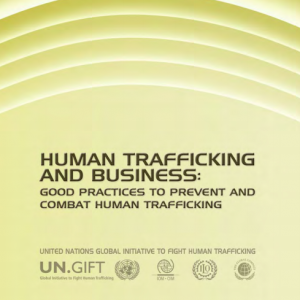 This report presents an introduction and overview of human trafficking and the role that business can play in addressing it. It draws from key case studies to illustrate some of the many ways employers can practically address human trafficking.
This report presents an introduction and overview of human trafficking and the role that business can play in addressing it. It draws from key case studies to illustrate some of the many ways employers can practically address human trafficking.Credit: UN Global Initiative to Fight Human Trafficking
-
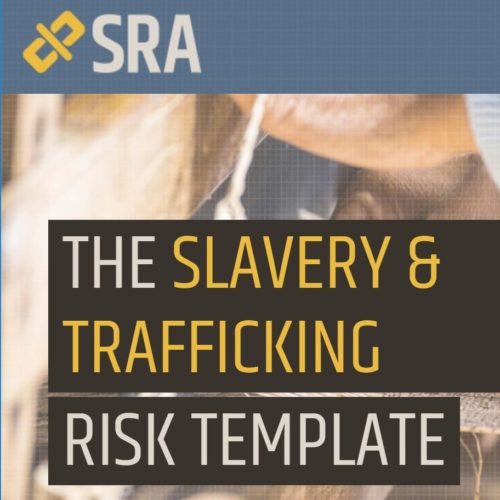 The Slavery and Human Trafficking Risk Template (STRT) is a free, open-source data collection template that forms the backbone of corporate modern slavery due diligence programs. It is maintained by a Development Committee committed to ensuring it keeps stride with new research and evolving industry needs. It is housed under the Social Responsibility Alliance, an initiative dedicated to providing companies with the open-source data collection tools they need to build socially responsible supply chains.
The Slavery and Human Trafficking Risk Template (STRT) is a free, open-source data collection template that forms the backbone of corporate modern slavery due diligence programs. It is maintained by a Development Committee committed to ensuring it keeps stride with new research and evolving industry needs. It is housed under the Social Responsibility Alliance, an initiative dedicated to providing companies with the open-source data collection tools they need to build socially responsible supply chains.Credit: Social Responsibility Alliance
-
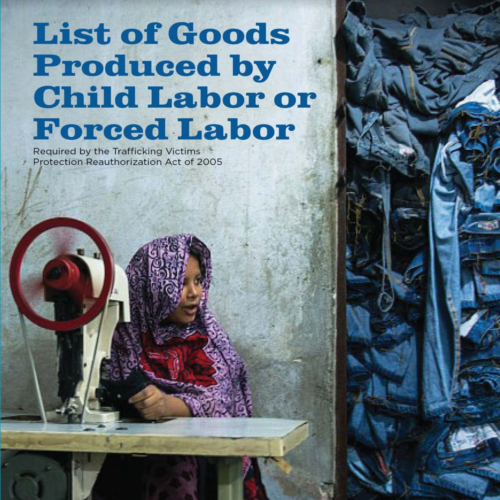 The US Department of Labor maintains a list of goods and their source countries which it believes likely to have been produced by child labour or forced labour in violation of international standards. It is not an exhaustive list and is primarily intended to raise public awareness, but is a useful starting point for considering the origins of any products bought for use by and within the hotel.
The US Department of Labor maintains a list of goods and their source countries which it believes likely to have been produced by child labour or forced labour in violation of international standards. It is not an exhaustive list and is primarily intended to raise public awareness, but is a useful starting point for considering the origins of any products bought for use by and within the hotel.Credit: US Government
-
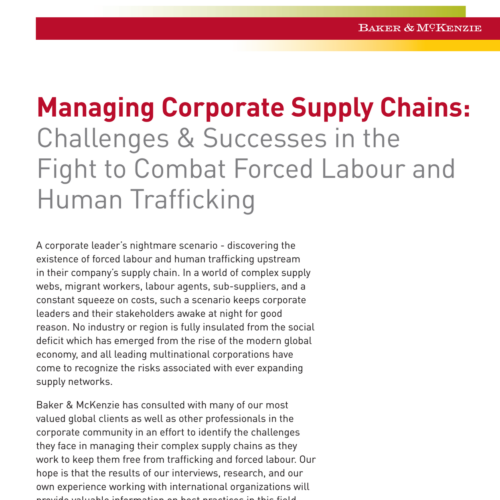 This guide is published by a law firm with expertise providing modern slavery related advice to business. It gives a good overview of the scope of the problem of trafficking in supply chains, and what existing support there is for business. It looks at the legal mechanisms already in place to protect against modern slavery in corporate supply chains, as well as the successes and challenges of corporate initiatives, and solutions to the problem.
This guide is published by a law firm with expertise providing modern slavery related advice to business. It gives a good overview of the scope of the problem of trafficking in supply chains, and what existing support there is for business. It looks at the legal mechanisms already in place to protect against modern slavery in corporate supply chains, as well as the successes and challenges of corporate initiatives, and solutions to the problem.Credit: Baker McKenzie

